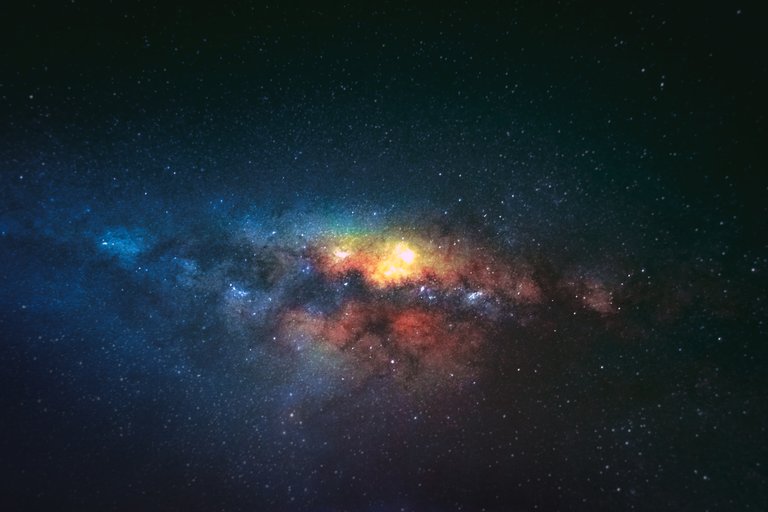A claim is considered truth when it’s supported with substantial evidence. Evidence has to be tested, re-tested and finally approved and considered highly likely. These claims are always open for change when new evidence proves the contrary.
Cosmolosophy is based on finding truth, which differs from religion. Religion used to be all explaining. What couldn’t be explained was ought to be god’s work. No further evidence was needed. In the last decennia science has slowly made the unknown increasingly more know. Parts that used to be explained by gods are now explained by science. Science dares to say it doesn’t know. That’s the beauty of it. Science knows it knows only little. A lot of questions remain, at the moment, unanswered. How did life come to existence, what happened or was before the big bang? What happened in the first few seconds the universe came to existence? Is there more intelligent life in the vastness of space? Does dark matter really exist?

One day we will manage to answer some of these questions. I’ll then be struck by joy and awe. The answers we find will be nothing like what we can imagine. Nature manages to constantly surprise us. Who would've thought that DNA is the code for us humans? And that it works the way it does, its helix shape, the way it reproduces its code. What makes it even more wondrous is the fact it’s true, evidence supports it. When we follow the evidence we see that all the living animals, plants and trees on earth have DNA. We share common DNA codes with trees while we seem to be nothing like it. It turns out we are in a sense part tree. All living beings on earth turn out to be family, some more distant than others. DNA is made out of molecules and molecules out of atoms and atoms out of neutrons, protons and electrons, the Legos that determine all matter, the building blocks of the universe. Again, who would've thought it exists and behaves the way it does. It’s mind boggling and it’s likely true, evidence supports it. It makes me want to bow to nature and praise it for its ingenuity and beauty, like a god.
Some will think that thus it must’ve been designed; the universe is just too perfect. But there is no evidence to support a designer so why should I bother? And why on earth should I then follow its orders, written in some book(s), while again there is no evidence these orders came from this unproven deity. Instead there is even evidence supporting it’s completely human made. We can prove for a fact that the bible is wrong when taken literally. But then some say it’s meant figuratively. Eventually the evidence is not decisive enough to be able to dismiss god or gods. But keep in mind that there is just as much evidence supporting a unicorn’s fart created the universe as is of the existence of Allah, Zeus, Thor etc..
Some people don’t mind if it’s true or not. They say it helps them in their struggles with life. The thought of a heaven and a supporting being is comforting to them. The thought that there just may be a god makes them shiver with spiritual sensations and appreciation. I’m reasonable with that, but there is another vision for life and a set of beliefs that I think are better. It provides the best of both worlds. Cosmolosophy, a combination of parts of science, philosophy and psychology. Its claims supported by evidence, its goal; emotional and spiritual fulfillment. Something religion also provides. I think all humans seek these fulfillments, no wonder religions success. But where religion shoots itself in the foot is its ignorance. It’s not based on truth or evidence. This ignorance will eventually result in bad decisions and immoral acts, the irony. Cosmolosophy provides certain ways to improve one's emotional well being with facts from philosophy and psychology, its spiritual fulfillment from the cosmos.
God isn’t that much different than the cosmos. In one-way god is the cosmos. We created god. Thoughts of him wander through our minds. The mind is generated by the brain, which is made of stuff, stuff from the cosmos. As Carl Sagan said:
“The cosmos is within us; we are made of stardust. We are a way for the cosmos to know itself”. The same occurs when people research the human brain, brain cells trying to understand brain cells. A quote by theoretical physicist Lawrence Krauss struck me deeply:
“Every atom in your body came from a star that exploded. And, the atoms in your left hand probably came from a different star than your right hand. It really is the most poetic thing I know about physics: You are all stardust. You couldn’t be here if stars hadn’t exploded, because the elements - the carbon, nitrogen, oxygen, iron, all the things that matter for evolution and for life - weren’t created at the beginning of time. They were created in the nuclear furnaces of stars, and the only way for them to get into your body is if those stars were kind enough to explode. So, forget Jesus. The stars died so that you could be here today”. It’s at least equal as amazing and inspiring as an all knowing god and creator of the universe. What’s best about the stardust thing is that it’s a lot more likely to be true; it’s supported by evidence. Which makes me conclude, again, that god and the cosmos aren’t that different. Just as we can worship god we can appreciate the cosmos.
By appreciating the cosmos these same fulfillments can be achieved, whilst its claims are supported by evidence. The best way to honor this god called “the cosmos” and do it justice by investigating its mysteries and unraveling its many beautiful and surprising secrets. Just the thought alone of what remains to be discovered makes me dream and wonder in excitement.